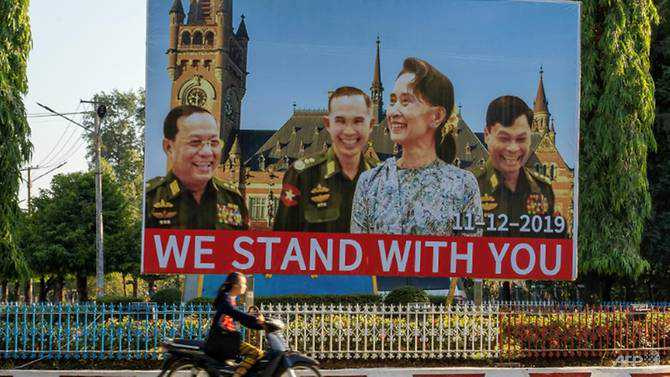Myanmar's Aung San Suu Kyi prepares to take on Rohingya genocide lawsuit in The Hague
08 December, 2019

From democracy champion to defending Myanmar against genocide charges, the shock decision by civilian leader Aung San Suu Kyi to face the UN's top court risks further damaging her image overseas and deepening the siege mentality at home.
"We stand with you," proclaim billboards across Myanmar, sporting beaming portraits of the Nobel laureate as she prepares to face the International Court of Justice (ICJ) over the Rohingya crisis.
Suu Kyi's supporters are printing off T-shirts, organising rallies and even signing up to VIP tours to The Hague to offer their backing.
Political parties and even some rebel armed groups have also fallen over themselves to give their support, in a country where the Rohingya garner little sympathy and are widely regarded as illegal immigrants.
Yet overseas, particularly in the West and in Muslim countries, Suu Kyi's reputation lies in tatters with multiple awards and even an honorary citizenship revoked.
Critics say "The Lady", once lauded alongside Mahatma Gandhi and Nelson Mandela, has become an apologist for a murderous military intent on wiping out the country's Rohingya Muslims.
The spectacle of Suu Kyi standing up in court on behalf of the nation might play well at home but she risks suffering a fatal blow to what remains of her international reputation.
"If she's only going to use the visit to demonstrate defiance and continue to defend the indefensible, then it only widens the impasse," Yangon-based analyst David Mathieson told AFP.
'BAD MANAGEMENT'
On behalf of 57 Muslim countries, Gambia will call on the ICJ on Dec 10 to announce interim measures to prevent any further genocide by Myanmar.
The tiny, mainly Muslim West African state alleges Myanmar breached the UN's Genocide Convention with its bloody crackdown against its Rohingya community two years ago.
Some 740,000 Rohingya fled into sprawling camps in Bangladesh, bringing with them accounts of widespread murder, rape and arson - violence UN investigators branded as genocide.
Myanmar says the operations were justified to flush out Rohingya militants and insists abuse allegations are under investigation by its own committees. Rights groups say those panels have only whitewashed the atrocities.
The UN team also accused Suu Kyi and her government of complicity in the violence - an astounding fall from grace for the one-time rights icon who endured 15 years of house arrest under the former military junta.
She has consistently dismissed criticism of Myanmar's military, including the damning UN report, insisting the outside world simply does not understand the situation's complexities.
A tacit acknowledgement at the World Economic Forum last year that "the situation could have been handled better" did little to quell criticism.
POLITICS OR PRINCIPLE?
Observers are divided over why Suu Kyi is now throwing herself into the spotlight to defend the military.
Some say shielding the armed forces will bring concessions over reforms to the military-drafted constitution.
"There will be more negotiation and give-and-take between the government and the military," predicted political analyst Maung Maung Soe.
Others suggest it is a political ploy ahead of elections next year, a vote-winner for Suu Kyi's National League for Democracy (NLD).
"The majority of political parties suspect (the NLD) will benefit at the election," Khin Yi from the opposition, military-affiliated USDP party told AFP.
Even in the face of some voter disillusionment, a landslide NLD victory is widely expected - arguably rendering any gamble unnecessary.
Myanmar historian and writer Thant Myint U dismissed notions the move was simply political, saying Suu Kyi believes no genocide was carried out - the position taken by most of the country.
"I think she genuinely feels a great anger at what she sees as an unfair response from the outside world. I think she genuinely wants to have literally her day in court and make this argument," he said at an event in Bangkok.
"I think she genuinely believes that there can be no one better to represent the country," he added.
Only a trio of rebel armed groups - the MNDAA, TNLA and AA, themselves locked in battle with the military - have dared voice support within Myanmar for the genocide charges.
Yet even they could not bring themselves to use the loaded word "Rohingya", referring to the persecuted minority in their statement with the pejorative term "Bengali", which suggests they are from Bangladesh.
Aye Lwin from Yangon's Islamic Centre of Myanmar said he thought Suu Kyi was doing the right thing by personally assuming responsibility and going to The Hague, where the full breadth of atrocities committed will be laid bare.
"It's not about winning or losing. It's about revealing the truth and correcting an injustice."
Source:
